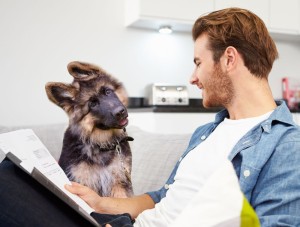How Can You Teach A Dog Its Name ?
Name recognition and getting your new dog to respond to you go hand in hand and are the very first lessons you’ll have to impart to your pet. Whether your new pet is a little puppy or an adult shelter dog teaching it its name will require consistent sessions as this process requires continuous reinforcement amid challenging situations and distractions.

The whole exercise of teaching a dog its name is to get it to respond to it. This means that the dog must instantly stop the activity it is involved in and turn to its owner for guidance. Some canines display selective hearing and this can be a problem as such dogs will only respond when they wish to instead of reacting every time. Image-www.scienceabc.com
Choosing a name for your dog is often coupled with doubt when getting home a shelter dog that already has a name given by previous owners. According to Sherry Woodard, an animal behavior consultant, teaching your dog a new name/nickname isn’t difficult and canines respond well to these changes if the name is taught properly and is linked to positive things.
Teaching the Name, Let’s Begin:
- Get hold of a pack of dog treats and take the dog to a location with few distractions. You can also attach the dog’s leash to one of your legs or a chair so that it doesn’t run away. You can begin the exercise once the dog looks calm and you have its attention.
- When the pup looks at you, speak out its name in a happy and excited tone of voice. Quickly use a dog training clicker or say the word ‘yes’ while the pet is still looking at you and offer it the treat. Communicate with the pet and offer affection.
- Repeat the exercise 6 to 8 times a day for 2 minutes each .
- Once the pooch connects his name with good things, you can up the difficulty level of the process. Enter a location where you wish to begin the training. Allow the pooch to relax. This time you have to distract it to something other than you. Speak out the dog’s name when it is not looking at you. If it turns to you use the clicker or the word yes and offer it the treat.
- Do not repeat the pup’s name if it doesn’t respond to you immediately. Wait for a while till it turns its attention to you.

Repeating the dog’s name will lead it to not pay attention to it when called out. Overusing the dog’s name will lessen its purpose. Image -www.rover.com
Practice this procedure for several days for the canine to get the hang of the whole process. You can then shift it to a more complex situation with greater distractions.
- You can also ask your friend/s to join in to help you with the training sessions. Your friend will have to stand near the pup and call out its name when it is looking away. If the pup looks at your friend, the latter can offer the yummy treat as a reward. Then you can call your dog’s name whilst standing near your friend. The two of you can take turns with getting the dog’s attention and giving it treats. Have the pet on a long lead so that it can even run between you and your friend for treats when the two of you move far from one another.
- Stop any training if the pet seems tired or over-excited. A puppy can be initially trained for two minutes each day.
- Never use the dog’s name when you are angry or trying to discipline the canine. The word ‘no’ and your dog’s name aren’t compatible either. Use positive reinforcement for rewarding your dog for responding to its name.
- You and other family members must stay consistent with the pet dog’s name. Avoid using nicknames.
- Even while walking the dog you can test its level of success with the lessons/if it will respond to its name. If you catch your dog sniffing the earth or a tree, call out its name. If it stops and looks at you, offer praise/a pat. If you fail to get its attention, try again a little later.
It will take some time for the dog to recognize its name. It is a process that requires consistency and continuous reinforcement. You can also turn any event with your pooch into a learning session. If you plan on adopting a puppy, make sure it is 12 weeks old when separated from its litter as by this time his hearing, vision and motor skills are well-developed. This means it will be easier for you to get his attention at this stage and teach him name recognition.

When your dog responds effectively to it’s name, It’s ADVANTAGE : YOU!
- Getting your dog’s attention: Teaching your pet its name will eventually help you with teaching commands/obedience training. You need to have your pup’s attention before commencing with teaching of new commands.
- You can call back your pet if its moving into a dangerous situation: If the pup has learnt its name well and responds to it, this can literally save its life. Think of a scenario when its leash comes off on the side of a busy road and it might try and run into traffic. Or when a dog fight ensues in the park, you want your pup to respond immediately to you and come to your side.
- To stop negative behaviors: Use your pup’s name to distract and stop him/her from inappropriate chewing and excessive barking. But when you use its name for this purpose remember to keep your tone chirpy and not angry. The furry chap must not comprehend its name to be a scolding.
- Sail through stressful/frightening situations: By associating the name with positive things for the dog like treats or affection from its human, you can use it to comfort and distract the pooch from something that is causing fear/distress in it. Some dogs are afraid of thunder, calling their name during a violent storm will help to calm them down. If while walking your pet on a certain path you notice it getting anxious for some reason, call her name and shift her focus to you. This way she will feel relaxed and less frightened.
Why do Dogs Bow? Dog Behavior DECODED
Article Resource: bestfriends.org
Disclaimer : Pets world India does not endorse any information/methods provided in the contents of this page or guarantee the effectiveness of the same. User Discretion is recommended.
For any queries, Please contact the writer by clicking HERE



